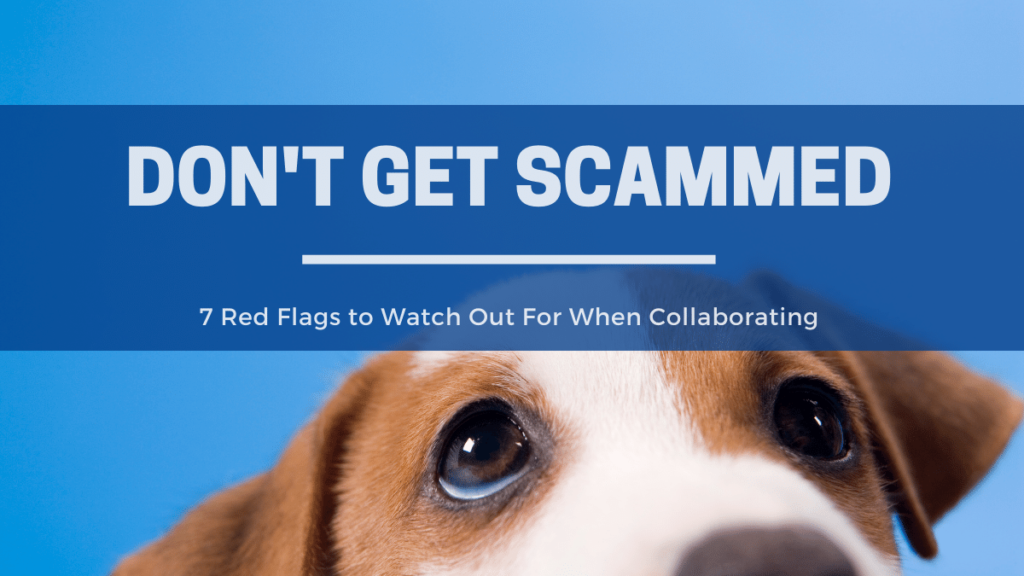There comes a time in every Instagram creator’s career when you land your first brand partnership. For us, it was an Italian paw cream. #sponsored
This milestone validates your hard work, it’s exciting to be selected, and who doesn’t want to get paid or get free products?
Yes, influencer marketing is real and it can be a great way to start monetizing your account. However, there are plenty of sketchy scammers out there looking to take advantage of influencers or pupfluencers.
The first step to protecting your account and your time, energy, and emotions is to know what is unacceptable.
7 Collaboration Scam Red Flags to Look Out For to Protect Your Pet’s Instagram Account
1. Verify the sender’s email address.
If someone sends you an email claiming to work for XYZ brand, and offers you some sort of deal or “exclusive opportunity,” do your due diligence at the start.
The first thing to check is if the sender’s email address matches the brand they claim to represent?
Typically, business email addresses look like [name of person]@[company name].com.
If the outreach email is coming from a personal email account or a company that differs from the brand they claim to be, chances are it’s a scam.
2. Notice who the email is addressed to.
When you opened the email, was it addressed to you, your account, or “parents of [name of pet]”? This is an easy way to suss out a phony sponsorship.
A legitimate brand outreach email will be tailored to you. They are trying to “sell” you on their offer after all. If it’s genuine, they will know your pet’s names and something about your account.
If the email feels like a generic mass email, it is. I’d recommend deleting and moving on.
3. Review the formatting of the message.
Does the font look funky? Are there rogue spaces? Is the email riddled with spelling and grammar mistakes? Yup, you guessed it. Most likely a scam.
Social media is big business. Companies and agencies hire people full-time for influencer marketing. That said, any outreach email from a reputable company or agency will be professional. It will look and feel business casual because it is!
4. Check out the company’s Instagram account.
If the email itself checks out or is too vague/short to tell, do more research before responding.
First of all, visit their Instagram account profile. Do they have zero followers? Scam. Do they have zero posts? Scam. Are they from a totally different niche than yours? It’s not a match.
This is also the fastest way to screen outreach messages that pop up in your DMs. Simply pop over to their page and if it’s a bot, simply delete their DM.
As a follow-up, I’d recommend also Googling the company. It could be possible that they are a new business about to build their social media presence. In that case, they might be lining up influencers to work with to “launch” their Instagram account. This is why it’s always smart to research the brand’s website as well as any other sites that come up when you Google them. If their website is equally questionable, move on.
5. Never pay upfront for the product or shipping.
If the email, Instagram account, and offer checks out, and you’re comfortable with the partnership, pay attention to the deal details.
Are they offering a free product, but need you to pay for shipping and handling? Or are they asking you to buy the product off Amazon or another site and will then refund you the expense? Those are clear indicators of a scam.
Never pay someone else to promote their product or service!
6. Never click suspicious links.
Regardless if the email or DM looks legit or suspicious, always be wary of clicking any links from any unsolicited email message you receive.
Cybercriminals use malicious links all the time to steal personal information. This is called phishing and it can cause serious problems.
Here’s a couple red flags to avoid with embedded links:
- Links that are urgent, misspelled, or are asking for money or personal information
- The embedded URL differs from the link displayed.
One way to check if the link is legit is to hover your mouse over the link. When you do this, you can usually see the URL. Is the URL what you’d expect to see (e.g., to the brand’s website) and does it start with “https://”? Then, it’s safe to click. If not, do not click it!
Always delete any suspicious emails or DMs that include these shady links.
7. Never give access to your Instagram account’s password.
If the “brand” requests access to your account for any reason – run! You should never share any personal information with anyone, let alone a business for a one-off deal.
At the end of the day, if it feels too good to be true, it probably is. Trust your gut. Regardless of the brand or the opportunity, if you feel like something is off, it most likely is.
Stay vigilant and safe out there friends!

